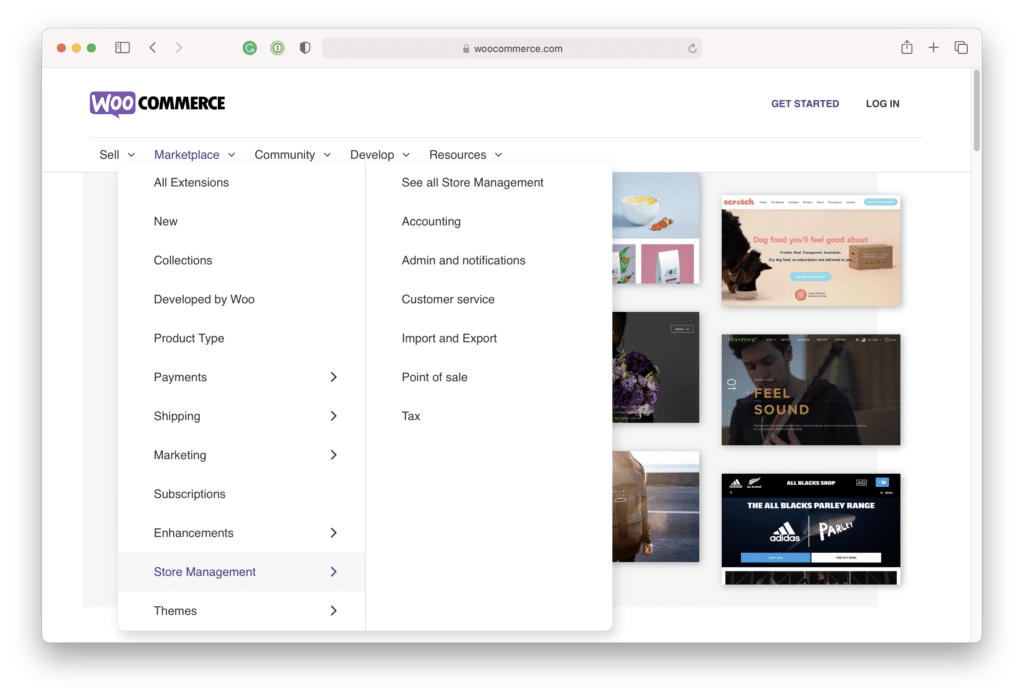Online shopping (or e-retail) has fast become one of the most popular online activities in the world. In 2020, 18% of global retail transactions were attributed to online sales; that’s 4.28 trillion US dollars earned by online stores worldwide. And these figures are only forecast to grow in and well beyond 2021.
While the move of global consumers to shopping online is not that surprising, the global Covid-19 pandemic undoubtedly accelerated retailers’ decisions to use their websites for sales. International lockdowns, curfews, and trading restrictions meant businesses and stores previously dragging their feet on stepping into the online space could no longer depend on foot traffic into their physical retail spaces to make sales.
Many brands had to fast-track their e-commerce offerings to present customers with alternative shopping solutions – just to keep the lights on.
Fortunately, several tried-and-tested ecommerce platforms and plugins (including Shopify, Magento, BigCommerce, WooCommerce, and Kibo) have been available for some time now to facilitate businesses’ moves to selling online.
This blog takes a closer look at one of these ecommerce solutions for WordPress sites: WooCommerce
Table of Contents
- What is WooCommerce?
- What functionality does an ecommerce site need?
- What does WooCommerce provide?
- Is WooCommerce SEO-friendly?
What is WooCommerce?
WooCommerce is a plugin offered by WordPress for adding ecommerce functionality to your website. If you have a standard WordPress site, but you now wish to sell products on it, you can integrate the WooCommerce plugin to convert your site into an online store.
Free to install and super easy to use, WooCommerce is a great e-commerce solution for WordPress. What’s more, it enables you to optimize your products and product categories easily whilst tracking metrics and gauging search engine optimization (SEO) results.
What functionality does an ecommerce site need?
There are many considerations for taking your products online: from choosing a payment gateway that can safely manage online payments, figuring out how to manage online inventory, how to sync accounting data from your website into your accounting platform, and managing order fulfillment with third-party service providers – it’s no wonder many retailers haven’t known where to begin.
Fortunately, WooCommerce was developed to make ecommerce for WordPress easy. Let’s take a look at how.
What does WooCommerce provide?
WooCommerce “out the box” enables you to sell and market your online products relatively quickly.

Setting up a WooCommerce store involves:
- Installing the plugin.
- Choosing a homepage design (The WooCommerce themes market offers a variety of design themes for your online store).
- Setting up your site structure, menus, and navigation.
- Installing and configuring the payment gateway, checkout, carrier plugin, and other extensions to handle your online orders, payments, and deliveries.
Product information management – activities like uploading product images, adding descriptions, and additional product attributes to the products you are looking to sell – can happen directly on the WooCommerce dashboard.
At the same time, WooCommerce has already set up relationships with major banks for accepting online credit card payments, online bank transfers, and even cash on delivery.
Like most open-source WordPress plugins, WooCommerce also facilitates the use of a variety of additional extensions to enhance the functionality and features of your WooCommerce store.
Here are some of the extra ecommerce functions on offer:
Online Payments
WooCommerce Payments allows you to manage and track your online store’s transactions without any setup costs or monthly fees. It supports multiple currencies and major credit and debit cards.
Additional WooCommerce extensions enable merchants to offer their customers online product subscriptions, pre-orders (via Amazon Pay, PayFast, Stripe, Sage Payments, and more), and secure online payments through their preferred provider.
Accounting
One of the major headaches of selling online products is consolidating business and accounting processes across retail and online stores. WooCommerce offers integrations with accounting software platforms such as Quickbooks, Zapier, and Xero to manage invoices, reconciliations, reporting, and inventory tracking.
Additionally, available accounting extensions enable you to sync your online store and accounting software so that orders, payments, products, invoices, and balances automatically update and balance the books.

Marketing
Online stores need online marketing. Once you’ve set up your WooCommerce store, integrations with third-party marketplaces, like Google Shopping, Facebook Ads, Google Ads, Pinterest, Amazon, and eBay are relatively easy.
Additional extensions for WooCommerce assist with connecting your online store with your social media accounts (Instagram, Pinterest, and Facebook, etc.), so you can share product catalogs and create shopping experiences on these platforms directly from your site.
WooCommerce also supports integrations with email marketing tools like Mail Poet, Mailchimp, and MarketingWoo. Mailchimp and Mail Poet are free to use, while you’ll pay a minimal annual subscription fee for MarketingWoo.
These tools help merchants set up several automated emails to send to online users based on their interaction with products on their sites. These automations include abandoned cart emails, follow-up emails, emails targeting inactive customers, and the like.
Zapier’s integration with WooCommerce also facilitates connections with other cloud-based apps so you can use existing email platforms, such as Gmail and Office 365, for your customer relationship management (CRM) and email marketing.
Reporting
The only way to confirm how effective your marketing efforts are is to integrate web analytics and reporting tools into your WooCommerce store to track traffic to the site and conversions. Fortunately, WooCommerce supports Google Analytics, Google Analytics Pro, and Google Tag Manager; it can also integrate with CRM platforms like Hubspot and WooCommerce CRM to generate reports on additional outreach activities.
Customer Support
A positive customer experience is more than critical for the success of any online store. There are multiple touchpoints and events on an ecommerce site that need regular monitoring to ensure an optimal user experience. This includes site speed, your store’s mobile responsiveness, how easy products are to find on your store, and how useful your content is when customers search for product information or answers to questions about returns, refunds, and delivery policies.
Quick access for customers to customer support services when things do go wrong – with product inventory, payments, checkouts, and deliveries, for example – can also make a huge difference in whether customers will walk away from a negative experience with your store still happy to promote your products and brand.
WooCommerce customer service extensions include integrations with Live Chat services and Help Desks like Zendesk, Freshdesk, and Intercom, where all customer complaints and queries can be handled in one place.
Shipping
How do products bought on an ecommerce site get to the people who actually buy them? This is where WooCommerce Shipping and other third-party logistics (3PL) software integrations come into play. WooCommerce Shipping can access local and international live shipping rates from carriers like FedEx, Aramex, USPS, DHL, UPS, so online users can know what will pay for delivery before placing their online order.
Once an order is placed and paid for online, various shipping API integrations enable everything from generating ready-to-print shipping labels for carriers, customers tracking their online orders, and merchants managing and syncing inventory from multiple locations.
WordPress Security
Site hacks, security breaches, and extended periods of downtime can do serious damage to any brand’s online reputation. However, more at stake for an online store is a direct loss of revenue from users unable to access a site to make a purchase. This means lost sales!
Fortunately, WooCommerce offers online merchants an efficient security and data backup option, Jetpack. Jetpack’s free version includes automated malware scanning, brute force attack prevention, one-click restores for sales data, and more.
Other extensions
A WooCommerce store can be optimized using several WooCommerce extensions. For example, the default checkout page can be customized using extensions for editing and removing form fields or for making certain fields conditional for populating.
There are extensions for adding product recommendations to product pages, enabling currency conversions to confirm prices, facilitating online orders via Whatsapp, and even allowing customers to create wishlists from your online inventory.
Making it easy for online users to type in keywords to find products on your site is essential. Fortunately, there are even extensions for search and navigation you can try and test to see which offers the best user experience. We recommend browsing the WooCommerce site to explore all the extensions available for your ecommerce needs.
Mobile App
WooCommerce has developed its own mobile app for you to download and install on your mobile device, making it that much easier to make changes, update inventory, or check to see that everything is still working on your online store.
This is on-the-go business management like never before and especially useful if you are a small team running an online store and juggling numerous responsibilities. Among other things, the app notifies you of real-time purchases, allows you to kick off order fulfillment from your mobile device, and even helps you manage multiple online stores at once.
Is WooCommerce SEO-friendly?
WooCommerce leverages WordPress’s built-in SEO features and enables integrations with WooCommerce extensions to enhance these SEO capabilities. RankMath is one such SEO plugin that integrates with WooCommerce and comes highly recommended for its built-in SEO audit module, image optimizer module, assistance with schema markup, and integrations with Google Analytics. You can read more about the RankMath plugin in Beginner’s Guide to Rank Math.
If you’re thinking of taking the plunge to start selling your products online, WooCommerce as a one-stop-shop for all things ecommerce is a great option.
Sign up for our Newsletter and let us start sharing our in-depth knowledge of everything related to WordPress.




Leave a Reply